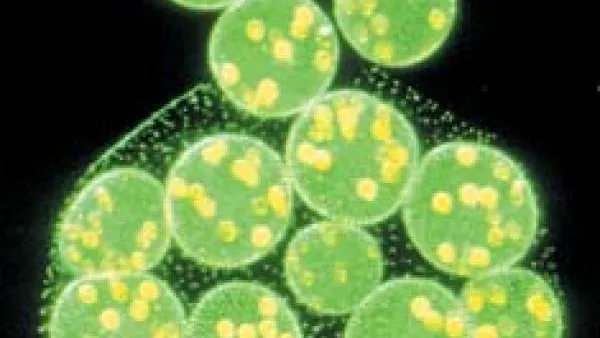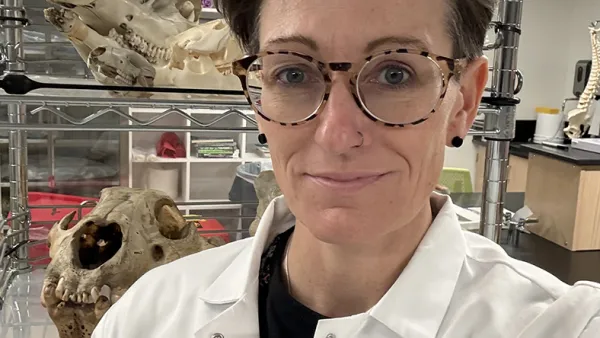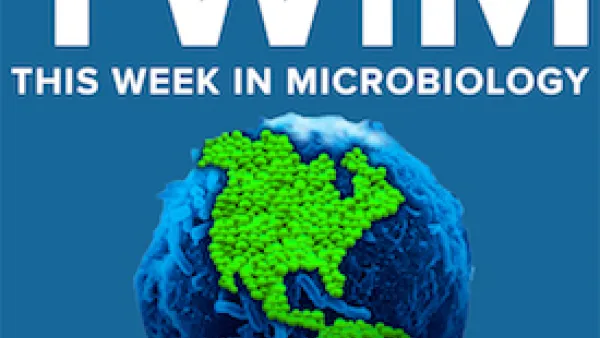April Bednarski grew up in Iowa, completing her undergraduate degree in Biochemistry at the University of Iowa in Iowa City, IA. Her parents both grew up on farms in Iowa, a long family tradition, but she was the first person in her family to enter a field of science. Her inspiration for scientific study began with the challenging and engaging classes offered by her middle/high school teacher Larry Zach. Though he retired from teaching, Zach now shares his passion for naturalism and conservation through art. He is a famous wildlife artist, known for his extremely realistic paintings.
April attended the University of Michigan in Ann Arbor where she completed her PhD in Medicinal Chemistry, focused on the biochemical aspects of pharmacology. She studied under Rowena Matthews, one of the first female faculty members at the University of Michigan. Dr. Matthews trained with Vincent Massey, famous for research in flavin enzymes, specifically Old Yellow Enzyme (OYE). Mechanistic enzymology was just at the brink of being understood at the time. Since flavin is yellow, it can be seen easily, providing a way to study the enzyme kinetics.
April’s focus in the Matthews Lab was on methionine synthase, a B12-dependent enzyme. Her grad school project was a classical study in protein chemistry, which turned out to be a great model to use in undergraduate teaching. Methionine synthase is the same enzyme she uses now in her course Bio 4523 Molecular Methods in Enzyme Analysis. What was done from a research perspective in grad school is now modeled as a course-based research project to introduce students to enzymology.
Upon completing her PhD, she began looking for teaching postdoctoral positions and found one with Sally Elgin, Professor of Biology at Wash U, to work on the development of the Genomics Education Partnership (GEP). The goal of the Genomics Education Partnership is to provide opportunities for undergraduate students to participate in genomics research. GEP is a collaborative between a growing number of primarily undergraduate institutions, the Biology Department and the McDonnell Genome Institute of Wash U. The program has grown immensely since 2003, attracting participants from all over the world.
April also learned a lot about science education through the Science Outreach program at Wash U, now known as the Institute for School Partnership, also a key player in the early development of GEP. Science Outreach had a series of journal clubs and other meetings that were helpful to April’s understanding of how to reach undergrads through teaching. She left Wash U to teach general chemistry and biochemistry at Lindenwood University in St. Charles for five years, then returned to the Wash U Biology Department as a Senior Biology Lecturer in 2013, teaching Bio 2960 Principles of Biology I and 2970 Principles of Biology II labs and providing instructional support for Bio 2960.
She created the upper level lab course Bio 4523 Molecular Methods in Enzyme Analysis based on her grad school studies of methionine synthase. This course, designed for juniors and seniors, is modeled to feel like an undergraduate research experience, rather than a traditional lecture style course with lab. Students work with partners to design their own research projects and carry out mutation-based enzyme studies. Students gain experience practicing science communication skills, writing journal reports and creating oral presentations and poster presentations. Students learn by reading and critiquing journal articles from the real world, completing bench work, troubleshooting, and designing their own lab projects. The course is largely self-guided and hands-on, offered every fall semester.
Outside of teaching, April enjoys skiing, yoga and visiting National Parks.



